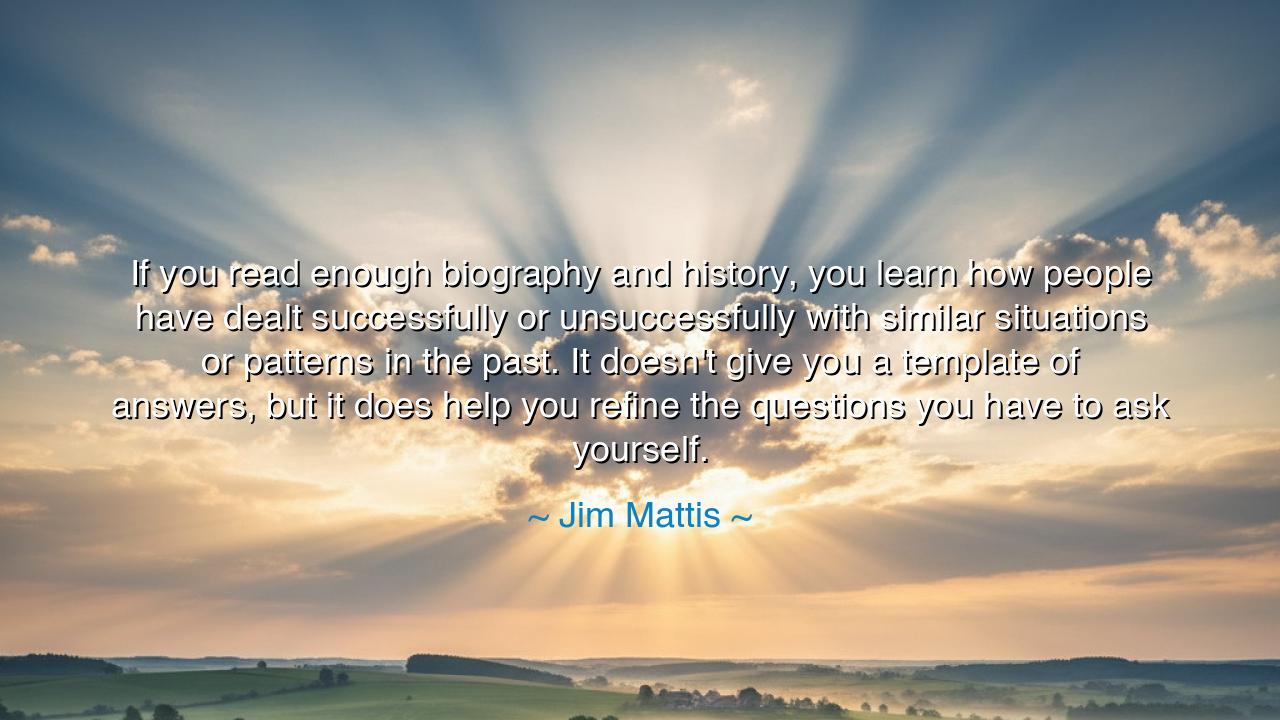
If you read enough biography and history, you learn how people
If you read enough biography and history, you learn how people have dealt successfully or unsuccessfully with similar situations or patterns in the past. It doesn't give you a template of answers, but it does help you refine the questions you have to ask yourself.






When Jim Mattis declared, “If you read enough biography and history, you learn how people have dealt successfully or unsuccessfully with similar situations or patterns in the past. It doesn't give you a template of answers, but it does help you refine the questions you have to ask yourself,” he spoke not merely as a soldier, but as a philosopher of experience. His words carry the weight of a mind disciplined in both battle and reflection. History, he suggests, is not a manual of solutions, but a mirror of human behavior, a vast repository of insight that illuminates the choices, triumphs, and failures of those who came before us. To study it is to sharpen perception, to see patterns, and to cultivate the wisdom of discernment.
The origin of Mattis’ reflection lies in his lifetime of leadership and service. A Marine Corps general and scholar, he confronted challenges of strategy, diplomacy, and human endurance that demanded more than instinct. In the crucible of command, he turned to the chronicles of history and the lives of extraordinary men and women for guidance. The study of biography and historical precedent offered him not formulas, but context; not certainty, but the illumination of possibilities. By examining past actions, he could ask better questions, foresee complications, and align decisions with principles rather than impulse.
Mattis’ insight resonates with the wisdom of the ancients. Sun Tzu, in The Art of War, taught that victory depends upon understanding patterns, strengths, and weaknesses — not merely replicating previous victories. Thucydides chronicled the Peloponnesian War to reveal enduring truths about human ambition, fear, and folly. Like these sages, Mattis recognizes that history is a guide to thought, a teacher of questions, not a prescriptive script. The mind that studies history learns to anticipate the unexpected, to weigh ethical and practical consequences, and to navigate the complexity of human action with foresight.
Consider the example of Abraham Lincoln, who studied the strategies of his predecessors and the decisions of world leaders to guide a divided nation through civil war. He did not replicate them blindly, but he discerned patterns: the importance of coalition-building, the necessity of moral clarity, and the perils of indecision. Lincoln’s reading of history enabled him to ask the right questions: How can the Union be preserved without sacrificing principle? How can authority be exercised justly in crisis? In this way, history shaped his inquiry and guided his judgment, even though the answers were his own to forge.
The meaning of Mattis’ words extends beyond military or political affairs into every sphere of life. In business, relationships, or personal growth, we confront recurring challenges — patterns of conflict, uncertainty, and human behavior. By studying how others faced similar situations, we refine our perception and prepare our minds to respond thoughtfully. History teaches not imitation, but intellectual empathy, showing us how ambition, fear, and virtue interact across time and circumstance. It equips us with the wisdom to anticipate consequences and to temper action with reflection.
Mattis also emphasizes the humility required in learning from history. No two situations are identical, and no formula can guarantee success. The study of past lives and events does not remove the weight of responsibility, nor does it promise certainty. Rather, it cultivates a mind attuned to nuance, capable of discerning the critical questions that shape judgment. To act wisely, we must first understand the lessons embedded in the struggles of those who preceded us, and then apply them with courage, discernment, and integrity.
O listener, take this teaching into your heart: read widely, study deeply, and let history sharpen your questions. Seek the stories of triumph and failure, of courage and folly, and let them illuminate the challenges you face today. Do not search for templates, but for insight; do not seek to replicate, but to understand and adapt. For the questions you ask of yourself will shape the answers you create, and wisdom emerges not from certainty, but from thoughtful inquiry.
In the end, Jim Mattis reminds us that the study of history and biography is a dialogue across time. The lives and choices of those who came before are teachers, guiding us to ask the questions that reveal truth, responsibility, and consequence. By engaging with their experiences, we prepare not only to navigate the challenges of our era, but to act with vision, courage, and clarity — forging a path illuminated by the wisdom of the past, yet crafted by our own hands.






AAdministratorAdministrator
Welcome, honored guests. Please leave a comment, we will respond soon